The first patriot who looked out to sea
Unlike previous generations of patriots, Phan Boi Chau knew how to look outward, toward the sea, even before the young patriot Nguyen Tat Thanh.
Professor Chuong Thau, who has devoted his life to researching Phan Boi Chau, commented on this in a story in early 2015, on the occasion of the 110th anniversary of the Dong Du movement (a movement of going abroad to "study" in order to return and develop the country).
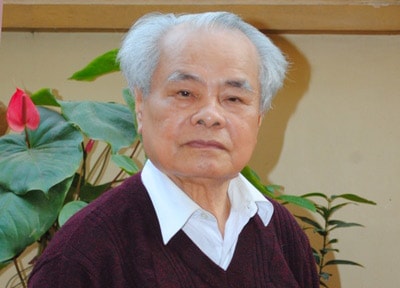 |
| Professor Chuong Thau - one of the leading experts on historical figure Phan Boi Chau. |
In the shortest possible way, professor, how did the formation of the Eastern Travel movement take place?
Professor Truong Thau:In my research, I have studied and evaluated what activities Phan Boi Chau did and how he contributed to the Vietnamese national revolution in the early 20th century.
Vietnam in the late 19th and early 20th centuries was a semi-feudal colony, the country was divided into "three regions", our people at that time suffered extremely.
When the French colonialists invaded, we had movements to fight for national liberation through two periods.
The period of struggle for national independence following feudal tendencies. Typical of which was the Can Vuong movement. However, by 1895, when Phan Dinh Phung's Huong Khe uprising failed, the Can Vuong movement was considered to have ended, marking the collapse of the banner of national liberation following feudal tendencies.
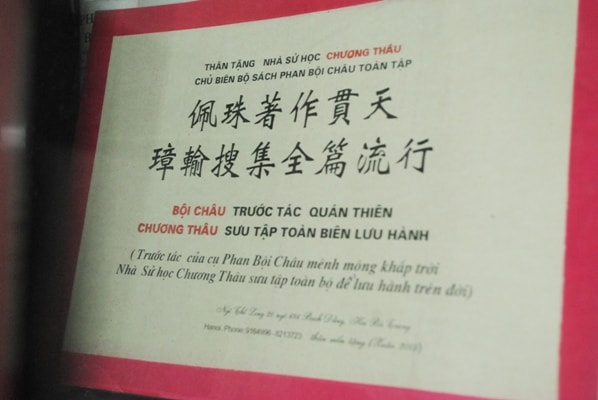 |
| Certificate of Merit received by Professor Chuong Thau after completing his role as editor of the book "Phan Boi Chau Complete Works". |
Influenced by Western and Eastern countries, Phan Boi Chau founded Duy Tan Association (1904) in Quang Nam. At that time, Phan Boi Chau was just over 30 years old.
At that time, we were lacking in material and weapons. Meanwhile, Japan was a powerful country, with the same culture, race, and continent as Vietnam, so Phan Boi Chau thought of going to Japan to ask for aid.
In early 1905, Phan Boi Chau left Vietnam for Hong Kong, Guangzhou, then Shanghai and boarded a ship to Japan.
Here, he met the intellectual Liang Qichao. The two had a very close conversation. Phan Boi Chau's initial plan was to ask for Japanese military assistance. However, some Japanese politicians such as Okuma and Inukai advised training talented people first, so he changed from "asking for help" to "seeking education".
From 1905 to 1908, the movement mobilized about 200 Vietnamese patriotic youths to study in Japan at schools. There were a number of revolutionary cadres who grew up from this movement such as Mr. Hoang Trong Mau, Ho Ngoc Lam, Le Hong Phong, Luong Ngoc Quyen, etc.
In 1907, France and Japan signed a treaty. In 1908, the Japanese government expelled Vietnamese students. At the same time, France tried to suppress families whose children were studying in Japan and those who financially supported the Dong Du movement. As a result, Dong Du was suppressed in 1909.
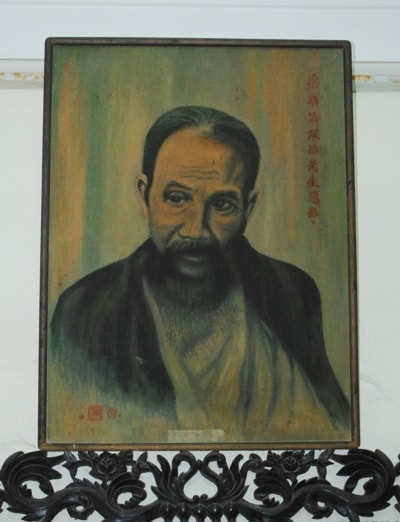 |
| The portrait of patriotic revolutionary Phan Boi Chau is hung in the middle of Professor Chuong Thau's house. |
What is the significance of the Eastern Travel Movement in the development of national history?
The Eastern Travel Movement was a choice of the times.
As a highlight in the national liberation movement, it was a shining milestone in the patriotic movement of our people in the early 20th century.
It is a traditional bridge connecting two historical periods, between the failure of the feudal-oriented patriotic movement and the success of the proletarian-oriented patriotic movement.
Although the Dong Du movement failed, its echoes and the image of Phan Boi Chau remain forever in the pages of history.
Patriotic revolutionary Phan Boi Chau was a central figure in the patriotic movement of the early 20th century.
He was more progressive than other patriots in absorbing Western knowledge and Eastern knowledge, from which he formed the idea of sending young Vietnamese intellectuals to Japan. From the need for force, he changed to the need for education, to learn knowledge to serve the cause of national liberation from the domination of French colonialism.
What is the progressive point in Phan Boi Chau's path to save the country compared to the previous generation of patriots, Professor?
It can be said that Phan Boi Chau was the first patriot who knew how to look out to sea.
Unlike previous generations of patriots, Phan Boi Chau knew how to look outward. Even before the young patriot Nguyen Tat Thanh.
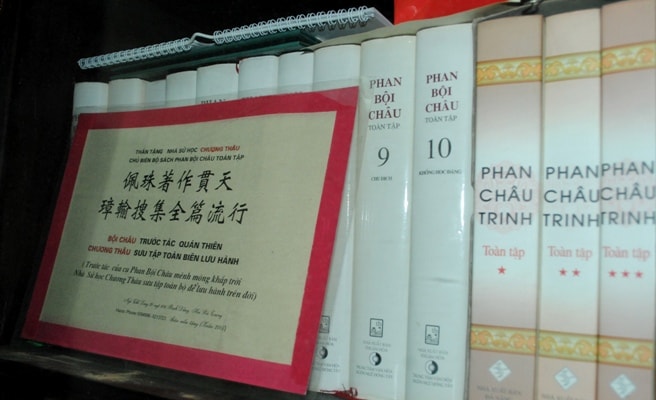 |
| Professor Chuong Thau devoted his entire life to researching the patriotic revolutionary Phan Boi Chau. |
Nowadays, many Vietnamese people go to Japan to study and work. However, some people commit bad acts such as petty theft, which makes the image of Vietnamese people ugly in the eyes of the Japanese. If he knew that "the descendants" would be like this, what would Phan Boi Chau think?
According to Phan Boi Chau's records, during the bourgeois democratic period, Japanese laws were quite strict, and their citizens did not commit fraud or theft.
Several decades ago, Phan Boi Chau realized this and affirmed that we are still inferior to Japan in this civilization.
I think, perhaps policymakers today should also learn from the Japanese way of dealing.
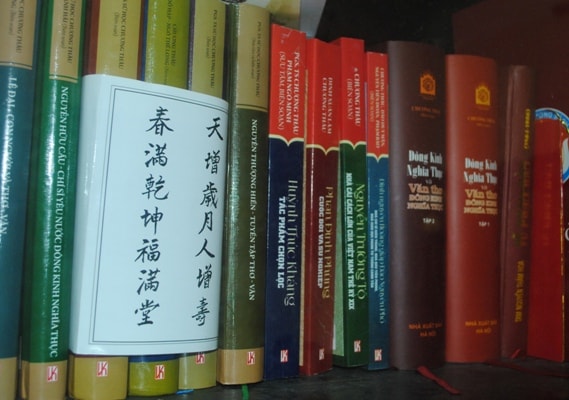 |
| Books about many historical figures compiled by Professor Truong Thau. |
In Phan Boi Chau's works, which works should young people read now, Professor?
During many years of leading the Dong Du movement, Phan Boi Chau composed many valuable works such as "Ai Viet dieu dien", "Hai ngoai huyet thu", "Tan Viet Nam", "De tinh quoc dan hon", "Viet Nam quoc su khao",...
All of Phan Boi Chau's works during this period, in addition to condemning the French colonial regime, also showed the close relationship between Japanese patriots and Vietnamese patriots. They especially strongly promoted the ideology and path of national liberation, and encouraged young people to study.
Thank you professor!
According to Vietnamnet.vn
| RELATED NEWS |
|---|
